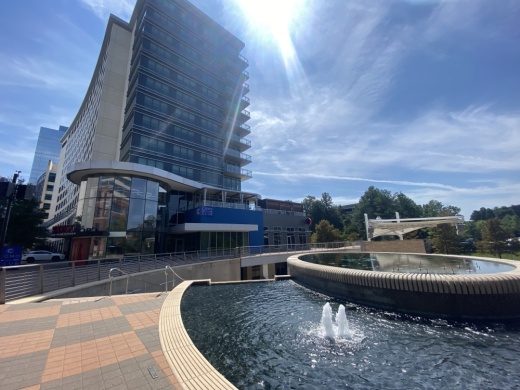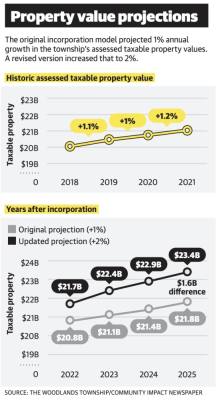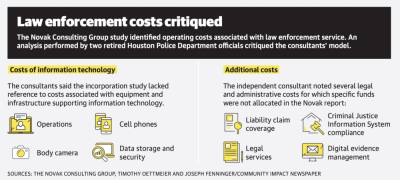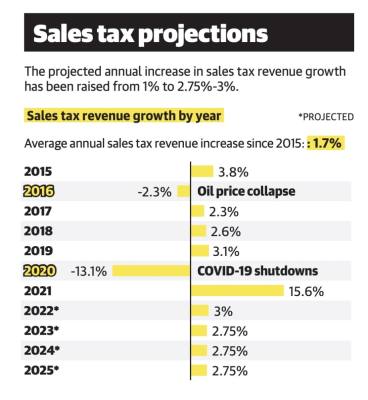Despite the initial costs of incorporation and the additional services a city of The Woodlands would provide, the township has proposed a maximum tax rate identical to its current rate of $0.2231 per $100 valuation. However, some community stakeholders have said they believe the costs of becoming a city will be greater than the township’s financial model for incorporation can sustain.
Opponents of incorporation have stated the new revenue estimates are a departure from how the township typically budgets and that the tax rate is too low to properly fund operations and an effective law enforcement department.
However, supporters have said the benefits of local control outweigh any additional future costs.The proposed rate presented at an Aug. 13 township meeting was a $0.06 decrease from the rate of $0.2862 initially proposed in February 2020. That rate was based on a financial model The Novak Consulting Group developed in 2018-20 as part of the township’s $1.29 million incorporation study.
The projections used in that model assumed a 1% growth in assessed property values in the township and in sales tax revenue each year. The new projections used 2% and 2.75%-3% assumptions, respectively. The increased revenue assumptions and several other factors eliminated the need for a higher tax rate, officials said.
Bruce Tough, a former chair of The Woodlands board of directors who served until 2015, said the increased sales tax assumptions were counter to the township’s previous approaches in budgeting.
“They’ve gone into this process saying, ‘We don’t want anyone to know the tax rate is going to go up, so we’re going to set it at the same rate we have. ... We’ll go from 1% to 2%, and no one will know the difference,’” Tough said.
Township officials have maintained the projections are conservative, citing examples such as internet sales tax revenue now being a factor—$4.1 million is projected in 2021—and a robust real estate market.“[Tax] revenues are much stronger than were projected, and our expenses have not grown much at all,” said Jeff Jones, the township’s general manager and president. “The combination of those two factors brought that increase down to a zero.”
Revised revenue assumptions
Some community leaders have criticized the township’s budgeting approach and the Novak study, stating they both overestimate certain revenues while understating other costs.
Because the township’s financial information changed as a result of the pandemic, Monique Sharp, the township’s assistant general manager for finance and administration, presented new data on sales tax and other revenues Aug. 13 to recalculate the maximum initial tax rate after accounting for about $10 million in additional revenue.
In the original Novak study, $18.1 million in new expenses were identified. The original recommendation was $8.4 million could be made up through franchise fees and the mixed-beverage sales tax. The remainder would have been made up through increasing the property tax rate.
Under the new model created by the township, additional revenue could be raised through higher sales and property tax revenue estimates instead of a higher tax rate, officials said.
Sales tax growth projections have historically been lower than this 2.75% projection. For example, the 2020 adopted budget assumed 0.75% sales tax revenue growth over the 2019 forecast. However, Sharp said Aug. 13 that sales tax revenue is now boosted by e-commerce sales tax, which began to be collected in 2019.
The Woodlands-based Howard Hughes Corp., which has taken a public position against this incorporation election, hired Bill Frazer of consulting firm RCREF to prepare a critique of the Novak study. The 15-page critique released Sept. 1 states the consultant’s opinion that Novak underestimated the initial funds needed for incorporation by $26.8 million. “The changes in assumptions in the updated model were a distinct departure from previous conservative estimates of revenue projection that had been used since the incorporation study began in 2018,” the RCREF report said.
Residents have also expressed concern franchise fees will be passed along to utility customers, resulting in added costs. Under state law, cities are able to collect franchise fees from utilities for the use of public rights of way, and utility companies can pass those costs onto customers.
The township’s revised financial plan also outlines a new way to fund reserves that township officials said will help keep the tax rate stable at $0.2231 through the first four years after incorporation.
Under this plan, capital reserves would be consolidated, and the township’s operating reserves would be remain at a steady $30.14 million each year rather than decreasing, Sharp said.
Jones said any claims that taxes will increase after the period projected by the study are unfounded. He also noted a state law prevents city revenues from property taxes from increasing more than 3.5% annually without voter approval.
“Anything beyond year five that is out there is pure speculation and the mystical land of unicorns and rainbows,” Jones said.
Law enforcement
Financial elements outlined in the law enforcement portion of the Novak study have also come under scrutiny in a report authored by Timothy Oettmeier and Joseph Fenninger, retired Houston Police Department officials. The 96-page report was also commissioned by The Howard Hughes Corp. for release in September.
The critique analyzed items including the ongoing operating costs and vehicle costs for law enforcement in the township. According to the original Novak study prepared in 2020, ongoing operating costs for law enforcement are $44.65 million for the first four years after the incorporation election.
The hybrid model of law enforcement after incorporation would be a blend of county contracts and personnel hired by the city of The Woodlands. According to the Novak study, it would require an additional $3 million to $4 million annually those first four years.“The first year post-[incorporation] there is no change to the township budget with regards to public safety,” board Chair Gordy Bunch said at an Aug. 24 board meeting. “We already spend $14 million in law enforcement. That includes purchasing the vehicles, paying the pension plan, overtime and paying the officers.”
The independent analysis estimated ongoing operating costs of $56.97 million, stating the renegotiated interlocal agreements enacted between the township and Montgomery County at the beginning of 2021 as well as 2% annual cost increases were not specified in the original study.
The updated financial model presented by the township Aug. 13 showed additional funds for law enforcement slated in 2022-25. In addition to the $14 million in the base budget for each year, it included additional revenue up to about $9.5 million slated in 2025 for law enforcement costs.
The critique also stated the authors believed new vehicle costs were underestimated by about $6 million in the first four years.
“They have included $714,000 annually [for vehicles], and that does not begin to pay for the cost of the vehicles,” Fenninger said.
The consultants also said the Novak model does not include certain expenses that would need to be assessed in a city that does not have police infrastructure.
They noted liability claim coverage, legal services, digital evidence management and Criminal Justice Information System compliance were not in the original study, all of which would be needed.
“Compliance with CJIS has enormous implications when creating a new police department,” Fenninger said. “It affects hiring practices, equipment purchases, access fees and operational protocols, which dictate how people are going to be managed in the organization. Absolutely none of those was included in the report.”
The critique was not available to the public until Sept. 14. As of press time, it is unknown whether the township’s updated financial model includes funds for specific items not listed in the Novak report.
Opposing views
Political action committees have voice opinions on both sides of the issue: Preserve The Woodlands and TownshipFuture took positions against the incorporation election in late August, and the Texas Patriots PAC took a position in favor of it.
Texas Patriots PAC President Julie Turner said in a Sept. 2 statement the PAC’s leaders feel The Woodlands would have greater local control as an incorporated city.
“The Woodlands Township is not recognized as eligible for federal funds in many cases,” Turner said. “Losing The Woodlands’ share of those funds relative to surrounding communities puts The Woodlands at a serious disadvantage for needed large-scale community projects.”
Jim Carman, president of the Houston region of Howard Hughes Corp., said the company has taken a position against incorporation.
“This poses true risks to the public safety of The Woodlands,” Carman said. “This can’t allow the safety of The Woodlands to be jeopardized by an unreliable plan.”
The Woodlands Area Chamber of Commerce had not taken a public position on the topic as of Sept. 3 but has asked the township to delay incorporation at least to 2022 in previous statements.
Bunch said the decision to hold a vote this year was due in part to the township’s failure to qualify for federal COVID-19 funding.
Nelda Blair, who was the chair of the board of directors when The Woodlands Township formed in 2010, said at the Aug. 23 forum she disagreed. Blair is a member of the Preserve The Woodlands board.
“A handout from the federal government is not a reason to incorporate,” Blair said.
As of press time, a public information session was scheduled by The Woodlands Area Chamber of Commerce on Sept. 15 at The Woodlands Resort, and a township forum was scheduled at The Woodlands Waterway Marriott Hotel and Convention Center on Sept. 23. The date for an additional forum to be held by The Howard Hughes Corp. has not yet been announced.








